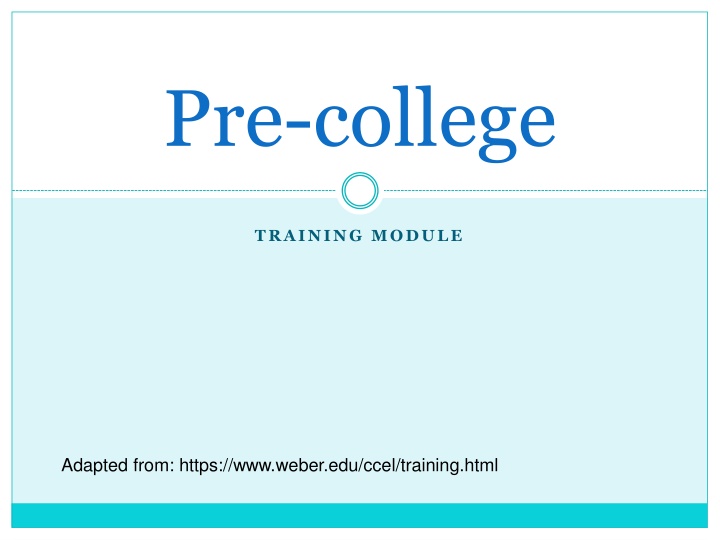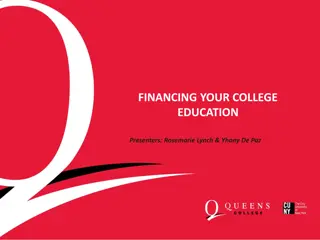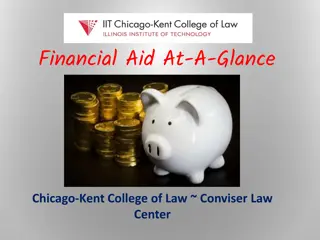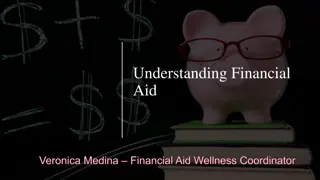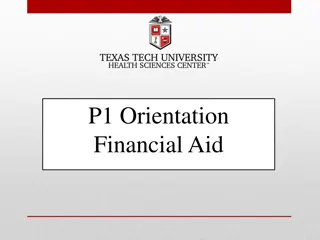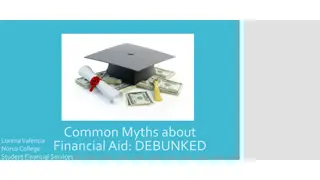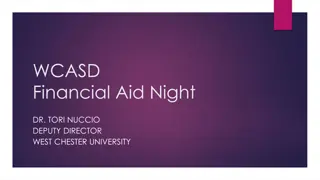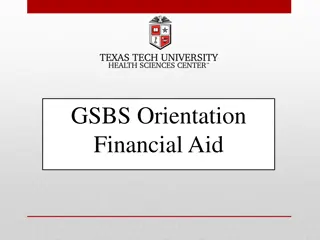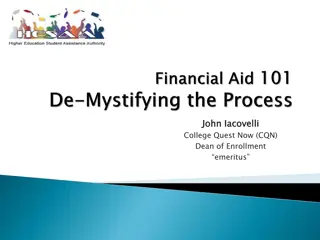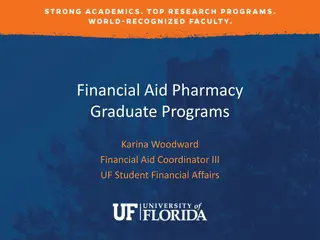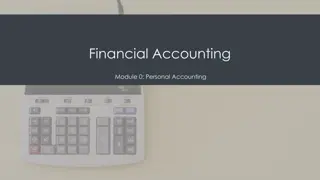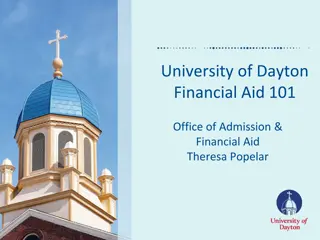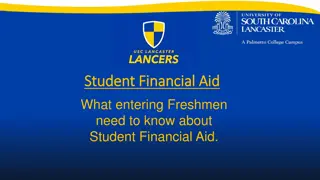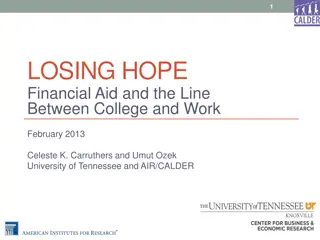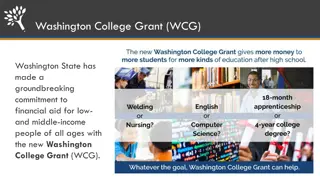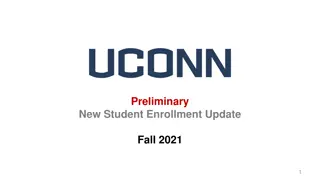College Preparation and Financial Aid Resources for Students
This pre-college training module covers various aspects of college preparation and financial aid resources to assist students effectively. Topics include GEAR UP introduction, college recruitment and selection, admissions, financial aid, and scholarships. GEAR UP aims to support students from low-income communities in achieving success in postsecondary education. It emphasizes the importance of academic mentoring, encouraging students to participate in activities to enhance their high school and college readiness. The module also highlights essential courses for admission to Arizona universities.
Download Presentation

Please find below an Image/Link to download the presentation.
The content on the website is provided AS IS for your information and personal use only. It may not be sold, licensed, or shared on other websites without obtaining consent from the author.If you encounter any issues during the download, it is possible that the publisher has removed the file from their server.
You are allowed to download the files provided on this website for personal or commercial use, subject to the condition that they are used lawfully. All files are the property of their respective owners.
The content on the website is provided AS IS for your information and personal use only. It may not be sold, licensed, or shared on other websites without obtaining consent from the author.
E N D
Presentation Transcript
Pre-college TRAINING MODULE Adapted from: https://www.weber.edu/ccel/training.html
Pre-College Module This section will discuss various aspects of college preparation and financial aid resources. Its purpose is to help you better understand college preparation so you can assist students as needed. Topics covered are as follows: Introduction to GEAR UP Talking to Students About College Recruitment and College Selection Admissions Financial Aid and Scholarships Based on: Massen, A. (2010). Professionalism Training Module.http://www.weber.edu/CommunityInvolvement/Mentoring_Tutoring. html
GEAR UP GEAR UP (Gaining Early Awareness and Readiness for Undergraduate Programs) is a grant program designed to help prepare students from low-income communities succeed in some form of postsecondary education. This grant works with an entire grade, beginning in seventh, and follows them through their first year of college. Arizona GEAR UP is administered by NAU and partners with XXX District. The Academic Mentoring positions in the District are paid for by Arizona GEAR UP.
GEAR UP The students you will be working with are all GEAR UP students. In addition to academic mentoring, they have the opportunity to participate in many events and services intended to help them prepare for success in high school and college. Academic Mentors should encourage students to participate in as many GEAR UP activities as they can and to go to their GEAR UP Coordinator whenever they need advice or assistance. Many Academic Mentors have found themselves telling students, I wish I d had GEAR UP when I was in 8thgrade!
Talking to Students About College Look for opportunities where you can speak with students about college. Using language like When you go to college instead of If you go to college has a positive impact. Never tell a student that they cannot go to college and never discourage a student from wanting to go to college.
Talking to Students About College Students need to complete specific courses to gain admission to Arizona s universities: Four years of English (English I, II, III, IV) Four years of Math (Algebra I, Geometry, Algebra II, Advanced Math) Three years of Laboratory Science (Biology, Chemistry, Physics, Earth Science) Two years of Social Science (one year of American History, plus one year of European/World History, Economics, Sociology, Geography, Government, Psychology, Anthropology, or Philosophy) Two years of the same Foreign Language One year of Fine Arts or CTE Source: Arizona Board of Regents
Talking to Students About College Find ways to link what students are learning to your own college experience. Mention how you used a method or equation in one of your classes and relate it to what they are doing. However, do not overwhelm them with college terminology.
Talking to Students About College Reflect college pride when mentoring. Students will be more willing to talk about college if you show that you are proud to be a college student. Tell them how important your education is to you.
Recruitment and College Selection As a mentor you are in a position to encourage students to attend college or other institutions of higher education. However, you may not recruit or pressure students into attending a specific college or university. NAU-logo U_of_Arizona_logo 1259117 eLogoLogoOver maricopaLogo1 AWC Logo
Admissions Admissions requirements vary from university to university. Most will have some sort of GPA minimum for acceptance and many have an ACT or SAT minimum for acceptance. Other schools, such as most community colleges, have open enrollment, which means that anyone is accepted. However, students will have to take math and English placement tests when enrolling at such institutions.
Financial Aid The most common means of accessing financial aid is by filing the FAFSA (Free Application for Federal Student Aid). FAFSA allows students to access the following financial aid: Federal Pell Grant Federal Stafford Loan Federal Perkins Loan Federal Work Study www.fafsa.ed.gov
Financial Aid Federal Pell Grant Federal Pell Grants are grants available to low income students. These grants are provided by the government free of charge and do not need to be repaid. Pell Grants help to offset the cost of tuition. The award amount varies depending on need and parents income.
Financial Aid - Stafford Loan Stafford loans are federal loans given to both undergraduate and graduate students. These must be repaid, with interest. There are two types; subsidized and unsubsidized. With subsidized loans, interest is not charged (does not accrue) while the student is in college, and payment toward the principle is deferred until 6 months after leaving college/college graduation. Unsubsidized loans are similar to subsidized loans except that interest accrues while students are in college.
Financial Aid Perkins Loan Perkins loans are subsidized loans that are available to students with greater financial need. They are available to both undergraduates and graduate students, however, there is a cap on how much a student can receive. An undergraduate can receive up to $5,000 and a graduate student can receive up to $8,000 in Perkins Loans. These loans need to be repaid with interest, once the student is out of college.
Financial Aid Work-Study Federal work-study provides part-time jobs to undergraduates and graduate students who have financial need. The program encourages work in community service fields or areas related to the student s course of study.
Scholarships Scholarships are monetary gifts awarded on the basis of academic performance, exemplary achievement or other factors. Some consider financial need. Scholarships are offered by colleges themselves, and by a wide variety of organizations. School counselors or university financial aid offices are reliable sources of information for many types of scholarships. Scholarships are free money Unlike loans, they do not have to be paid back. Unlike work-study, students don t have to perform work to receive the funds.
Scholarships There are many different types of Scholarships: Merit-based scholarships - based on a students academic performance in high school. Writing Scholarships Athletic Scholarships First in Family Scholarships designated to help students who are the first in their family to go to college. Company Scholarships Artistic/Talent Scholarships Community Service Scholarships Weird Scholarships (duct tape)
Quiz Many universities have a high school GPA minimum requirement. True False 1. When speaking to students about college, what type of phrases should you use? If you go to college College is not for everyone When you go to college All of the above. 2. Which is not a type of federal financial aid? Pell grants Work study Private Scholarships Perkins loans 3.
Quiz 4. You cannot recruit students to attend a specific university. True False 5. Scholarships are only for athletes and A students True False
